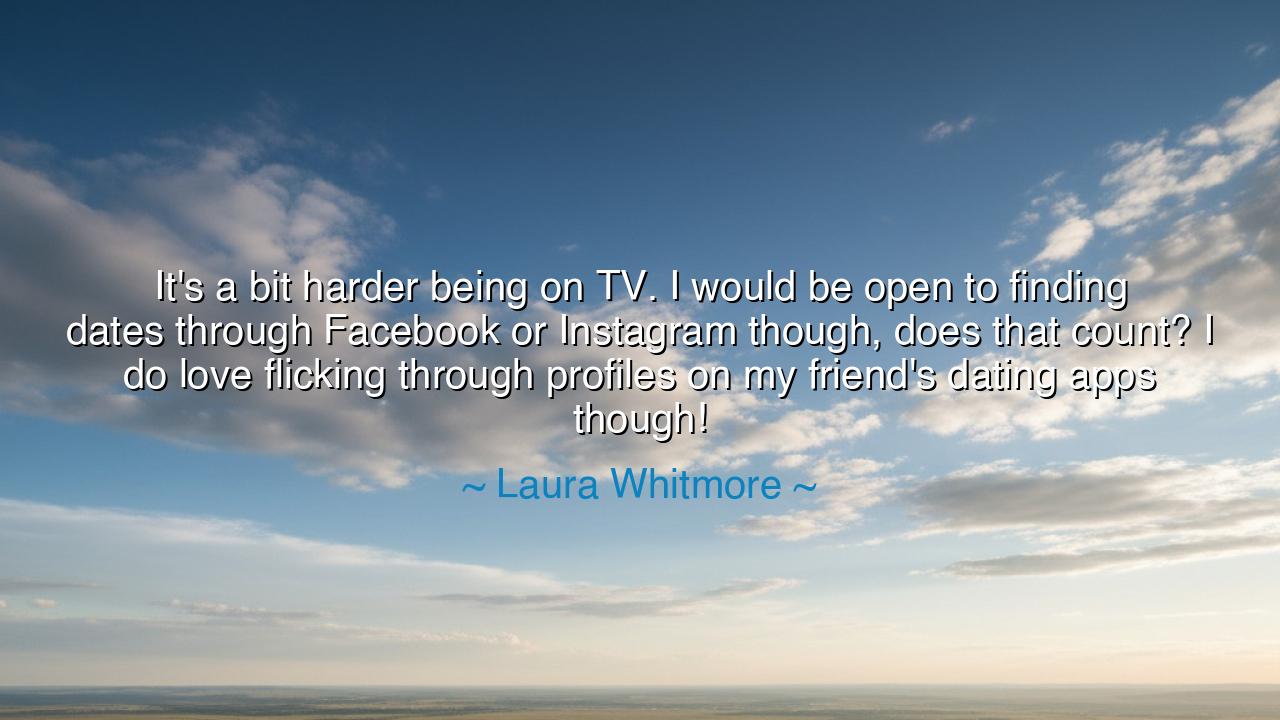
It's a bit harder being on TV. I would be open to finding dates
It's a bit harder being on TV. I would be open to finding dates through Facebook or Instagram though, does that count? I do love flicking through profiles on my friend's dating apps though!






The luminous broadcaster and storyteller Laura Whitmore once spoke with a smile both honest and human: “It’s a bit harder being on TV. I would be open to finding dates through Facebook or Instagram though, does that count? I do love flicking through profiles on my friend’s dating apps though!” Beneath the laughter of her words lies something ancient and profound — a reflection on the loneliness that sometimes hides behind fame, and the universal longing to connect, even in the age of glowing screens. Though her world is modern, filled with cameras and digital light, the essence of her message is eternal: that love, in every age, is both a search and a surrender.
Whitmore’s words reveal the paradox of visibility — that to be seen by many does not mean to be known by anyone. The life of those who dwell in the public eye, as she does, often becomes a kind of performance, where every smile is captured, every gesture interpreted, and every silence questioned. In such a world, even the simple act of dating becomes a challenge. Her admission that being “on TV” makes it harder speaks to the age-old truth that connection cannot bloom where masks are worn too tightly. The heart craves authenticity, yet fame often demands disguise.
The ancients, though they knew nothing of television or social media, understood this same struggle. The philosopher Seneca warned against living “for the eyes of others,” reminding us that the more we perform for the world, the more we lose sight of ourselves. In a way, Laura Whitmore’s quote is the modern echo of that wisdom. She stands between two realities — the outer life of the admired and the inner life of the searching soul. Her willingness to explore love through Facebook, Instagram, or even through her friend’s dating apps, shows not vanity, but vulnerability — the timeless desire to reach out, to meet another not as a persona, but as a person.
Her words also carry humor, and through humor, wisdom. When she says, “Does that count?” she reveals something universal: the uncertainty of modern love. We live in an age where connections are abundant but intimacy is scarce, where digital interaction has replaced chance encounters beneath the stars. Yet, even in this shifting world, her joy in “flicking through profiles” reminds us of the playfulness that still lives within the search for companionship. It is the same spirit that once led young poets to write sonnets or travelers to leave home in pursuit of someone who stirred their soul. The tools have changed; the longing has not.
Consider the story of Cyrano de Bergerac, the poet who helped another man woo the woman he loved by writing letters in his name. Cyrano, like the modern romantic behind a phone screen, hid his true self behind words and wit. His tragedy was not that he loved, but that he feared being seen. In Whitmore’s reflection, there is a quiet reversal of that story — she does not hide; she reaches out. She invites the possibility of love even in unconventional places, proving that courage in the heart matters more than the form of connection.
There is also humility in her tone, a kind of surrender to the realities of modern existence. She does not scorn technology; she accepts it as part of her world. This acceptance itself is wisdom — for the wise do not fight the tools of their age, but use them to serve deeper truths. Whether through letters in ancient Rome, telegraphs in the 19th century, or apps today, love has always adapted. Laura Whitmore’s openness is a lesson to all who seek: the method may evolve, but sincerity must remain constant.
So, my listener, take this teaching as both comfort and counsel. Do not be ashamed of how you seek love — whether through the hum of screens or the touch of chance — but do not forget the essence behind it: the courage to be seen truly. Let your words be honest, your intentions pure, and your heart ready. As Whitmore’s humor and humanity remind us, love is not confined to one time or one way of finding it. What matters is not the platform, but the person; not the exposure, but the exchange of spirit. Seek not attention, but connection — for even in this digital age, the oldest truth remains: that two souls, once they find each other, need no audience to know they have arrived.






AAdministratorAdministrator
Welcome, honored guests. Please leave a comment, we will respond soon